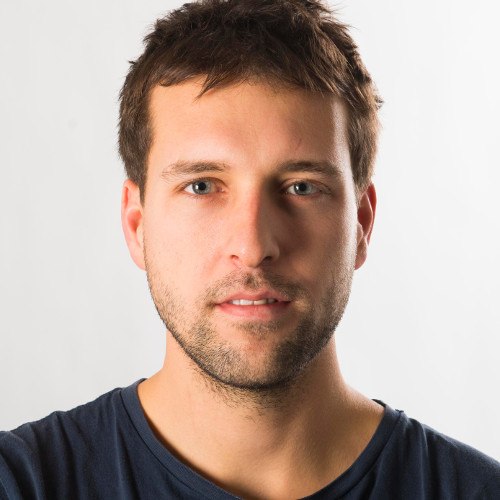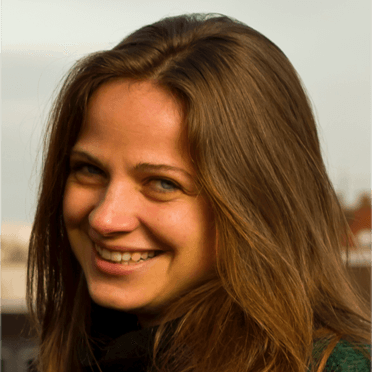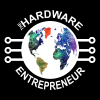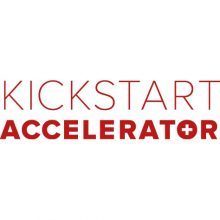I had a duo-feature interview with Kickstart Accelerator from Switzerland, Patricia Schlenter, responsible for Program Lead and David Emmert, head of one of the verticals of the program.
In a previous episode, we had Brinc on the show, an IoT accelerator. This time we feature another accelerator, which has a wider range of disciplines they’re handling, but still, also hardware topic comes up in their portfolio of companies.
Now a little bit about my guests. As for Patricia, she received her Bachelor’s from Bocconi University, Milan, Italy and her Master’s in Energy, Trade of Finance from Cass Business School, London, UK. She subsequently worked in the shipping industry in London, then started her own fashion accessory company. Shortly afterwards she became a co-founder for a Venture Capitalist’s startup in Berlin, Germany.
David on the other hand has a background in biology and economics and likes to create and work with people with lots of energy. When he is not busy with Kickstart, he's working on his own startup "Imagine Cargo" in the area of sustainable logistics.
In this episode we’ll discuss what they do, all the verticals they have, what their differentiating factors are from other accelerators, the corporate partners they partner with, the steps a startup would go through when working them. They explain their business model, what disruption means for David and many more. Enjoy.
Please have a look at the highlights below and enjoy listening.
For completeness, besides the accelerator's logo, I've put additionally headshots of Patricia and David who for me equally stand for Kickstart Accelerator.


Episode Notes
- An overview of one of Europe’s largest multi-corporate accelerators – [3:24]
- What does a Vertical Lead and a Program Lead do in Kickstart Accelerator? – [5:03]
- How David defines disruption – [6:00]
- The selection process of Kickstart Accelerator – [7:20]
- David walks us through their program using an example from food vertical – [8:40]
- The unique features of Kickstart Accelerator – [10:08]
- The accelerator’s business model and why David thinks it’s sustainable in the long run – [11:08]
- Switzerland’s drive to catch up with startup innovation – [12:30]
- What are the sources of inspiration of Patricia and David? - [13:48]
- If you could time travel and go back in time to your early 20s, what information would you give yourself? – [15:40]
- Books which had the biggest impact on their career and entrepreneurial thinking – [16:25]
- Morning routines and creative chaos – [17:00]
- Some striking cultural differences in their work that they had to overcome– [18:00]
- What is the best way to reach Patricia and David? – [19:28]
Books / companies / links mentioned
- “The 4-hour Work Week” by Timothy Ferris
- “The Lean Startup” by Eric Ries
- Kickstart Accelerator
- Digital Switzerland
- Dalou
Contact
Episode Transcript
Balint: In this interview I'm pretty excited to talk to Kickstart Accelerator, which I visited here in Zurich, Switzerland. This is like a duo feature interview, you will hear it soon what I mean with that. Kickstart Accelerator is one of the most significant accelerators of Switzerland, even though they are relatively new, and also one of the largest multi-corporate accelerators of Europe. Here I have Patricia Schlenter, who is responsible for Program lead of the accelerator, and David Emmerth, who is responsible for Vertical lead. Welcome, Patricia, to the interview, and David.
David: Hey, everyone. This is David. Nice meeting you.
Patricia: Hi, I’m Patricia here. Nice to meet everyone.
Balint: To start off, nowadays there's the question that disruption, this topic comes up, and how I see it is that rather than asking the question if disruption will happen to a company, the question is more when it's going to happen. As I see here there is this accelerator but there are also other ones coming up in the world and this is like an answer to this question, targeting this, so how you can proactively look at disruption and help startups to start out and validate the business model. I've come in contact with you guys, the accelerator, because, well, I live here in Zurich, and also because I've been in contact with some of the companies here that graduated from your program, and it would be nice if you could give an overview now about what you are guys doing, the accelerator briefly, and also what your roles are in the accelerator.
Patricia: Sure. Happy to do so. I think, as you just mentioned, Kickstart Accelerator is one of Europe's largest multi-corporate accelerators. It is an initiative by Digital Switzerland. It's actually the main initiative of Digital Switzerland, which has set the aim to make Switzerland a digital hub. So what we precisely do in this accelerator is that we invite international startups, and also Swiss startups have the possibility to participate in our 11-week program. During this program the startups have access to mentors, experts, tailored masterclasses to their needs; they have the chance to win a prize money, get stipends, meet investors and basically get a close look into the Swiss ecosystem.
But this is not all. Our most…, we have two points which are our most interesting points, one of them being that we take no equity and the other one is that the startups basically have the chance to win a Proof of Concept with large corporations. So in our program we have over 15 large corporations, which participate, and our aim since the beginning when we reach out to the startups, we are looking for startups who could eventually then enter a partnership, let’s quote in quotation marks, “basically that Proof of Concept with the large corporations.”
Balint: Sounds good. And what about your roles? So, as I said, you have two different roles here and I was wondering if you could comment on that?
David: Yes, sure. So we have set up the team in all kinds of different roles. One of which is Vertical lead and this is my particular role. We have four verticals in this program: Fintech, Foods, Smart cities and Robotics and Intelligent systems. And each Vertical lead is kind of responsible for one vertical. What does that mean? It essentially means managing the partners, it means managing the selection process, it means being the main contact person for the startups, it means managing that PoC process that we just heard. But we don't want to think too much in silos. So, of course, as a Vertical lead there's lots of cross functions that go with that as well, like in the whole programming mostly. In the outreaching communication we are all involved.
So that's kind of my role, and I would like to add actually one thing that you said before on disruption. I'm not a huge fan of this concept. I think disruption for me happens in the sense of technological advancements. So you could say the Internet was a disruption or now we're talking about artificial intelligence. The technology behind it is a disruption. But then, I think innovation and in the startup context fewer startups are disruptors, of course, everyone wants to have them and it's nice, but I think the real innovation is a real continuous process that maybe makes use of disruptive technology. So I think if you just focus too much on disruptors, I think you have a bit of a skewed view on this. So, of course, we want to have, everyone wants to have the unicorns and the disruptors, and that kind of stuff. But, personally, I think innovation happens much more on a continuous, small-steps scale that makes use of disruptive innovation, if that makes sense.
Patricia: Just for my role, Program Lead. Actually, I'm co-leading this project and my role basically overseeing from… I always say from day-to-day activities with Vertical Leads, program development team, investor engagement, marketing, PR, a lot of government structures as well. So, it's basically everything.
Balint: Now that we heard about your roles and also a little bit about disruption, can you tell us about, let's say, one of the companies as an example how it went through your program, because I think it's good that people see all the steps that you follow, including the application, maybe even commenting on how many applications you get, acceptance, acceptance criteria and the different steps. So this is one thing. The other thing is what is the differentiating factor for your accelerator? So, if a company, a startup wants to come to you, why should they come to you?
David: I can maybe take up the first half of the question. I'm going to start with the selection. Selection, there is a whole process behind it and it involves different steps and different criteria are applied along the way. And there's a whole set of criteria, which I'm not going to go through now individually. Naturally, the classic ones as team is a very strong one, we look on business potential, we look on the traction what it has been already there. We also really involve our partners in the selection process because, as Patricia mentioned before, PoC is one of the goals, not the only one but one of the goals so naturally in order to facilitate those PoCs, we want to already kind of get the interest from the partner in the selection process. Having said that, in the end it's Kickstart Accelerator team who decides who selects on the startups.
The second question was, I think, one example from last year. So I'm going to pick…Actually, I’m the Vertical lead of Food, I haven't mentioned that before. So I’m going to talk about a food startup last year, which I think is a good example. Because Patricia mentioned before Digital Switzerland wants to promote Switzerland as a place of innovation and so we want to attract foreign talent. And this particular startup, Dalou, originally from England, they launched a breakfast delivery services for mostly SMEs, but corporates as well. And so they came to Switzerland and they wanted to launch in Switzerland, and they had no idea. So essentially, we walked them through that whole process of incorporating, of finding partners here, of finding local distribution channels or finding local stuff. So after the eleven weeks, also with the help of their mentor, which is now actually a co-founder and an investor in their Swiss corporation. And so now, after the eleven weeks, they have formed a limited company here, they have a team on the ground. And they're trying to really push their business. One of the original founders stayed here, the other one went back to London. So I think that's one of the good examples we can mention of how a startup can walk through the eleven weeks and really set up business here. And I picked one that is not a PoC case because we don't want to just talk about PoCs, PoCs is one thing but we also offer other things, so that's why I think this one is a good example.
Patricia: Yes. Maybe to come to your second part of the question, what makes us unique, right? Okay. Even though David said we don't only talk about PoCs and it is definitely one of the factors, which is very important and just the access you can get to those large corporations is very sexy. And then, of course, their having a no-equity in there is also a very attractive part.
Balint: To continue this topic, because I think it's quite unique that you don't take equity, the question rises what is the business model? So how do you in the end sustain yourself and help out the company? So where the money is coming from and also what is the advantage of big corporates to be involved in your program? So, and this equity issue it has pros and cons, how do you see this?
David: The equity model in acceleration is not an easy one, right? I think there's not... If you would really look at the numbers, most people wouldn't talk about that, I don't know how many accelerators out there who are profitable from the deal flow from equity they take in startups. I mean, I don't know, our business model is essentially really one that relies on funding through corporate partners so that's kind of an ongoing sales process. I think, why it's sustainable? It's because there's a real commitment from these companies to Digital Switzerland and the commitment comes essentially from their need to deal with digitalization and all that comes with it. So those people are really looking for innovation and that's why you also have to look where the money’s coming from. It's not coming from the marketing or PR departments, the money is usually coming from real business units or innovation units, so that's why I think it's kind of sustainable in the long run that there's a real commitment in wanting to innovate and wanting to get new solutions, in knowing how to deal with digitization.
Patricia: Yes, I can only second that point. I mean, the commitment is really true. People really want to make the change. Everybody in Switzerland is very on that and wants to make it a digital hub. So there is a very true and honest commitment there.
David: To that question, also one factor that we haven't mentioned throughout this interview and that most people don't actually know, I have only found out quite recently that Switzerland has been number one in global innovation index for something like the last eight years. But this is really driven mostly by patent-driven-research-corporate-innovation type of innovation so the index does not really cover startup innovation. And we all know Silicon Valley, Berlin, London and other places around the world, of course, really lead this race. And Switzerland wants to catch up and that's where also this whole Digital Switzerland is coming from. And that's where the partners also want to go. So there's a real understanding that we are lagging behind in that type of innovation. And there's a real drive to try to make up for that.
Balint: This information that you just said that Switzerland has the number one index in the world is also on my website on the intro. I've also seen this, it's quite amazing and I agree that this reflects the innovation capacity of big corporates usually, and it's great that you're trying to change this or optimize this situation by helping also smaller startups to pop up. And what about you personally guys, just the listeners can maybe feel a little bit more personal connection, what are your sources of inspiration?
David: Personally, my background is kind of not at all in startup and tech, and whatever, and I am biologist originally by training and I spent a bit of time in research and then kind of through a coincidence I got into entrepreneurship through a friend who set up the business and had money and I kind of had time at that time, and that's how I got into it. And then I just really liked this process of creating and of energy you get from it. And I'm working on my own business on the side. So I think, for me, I really enjoy just seeing stuff happening and the speed and the excitement of people who work on their own projects. So I think that's where my inspiration comes from.
Patricia: Yes. As for myself, I have a startup background and had a few startups myself, worked in incubator, worked for a VC, so quite familiar with the scene actually, yeah. But just like David said, it's definitely that drive how you make things happen and the speed behind it, the passion. It's just like and that unique… I think it's a very unique factor you just create whatever you need. You just create and you do it, and you really can see that impact within a few days, few hours, few minutes. You just decide and you go ahead.
Balint: Thanks a lot for giving us this overview about Kickstart Accelerator. I appreciate it. I would propose we should move on now to the final round. This means that I will ask four questions and it would be great if I could get short answers. Now that you are basically two in front of me, it's going to be a bit more challenging than usual because this is the first set up that I've had with two interviewees, so it would be great if you could make it short. The first question that I have is if you could go back in time to the time when you were much younger, in your early 20s, 18, 19, what information would you give yourself?
David: I think I would definitely start to learn to code. I did a fair bit of statistical programming as part of research but I think if you go with code and tech, like it's everywhere today, so I would do probably the same.
Patricia: Yes, that's definitely one. But also just basically go ahead and do it, right? Don't shy away from the moment, just don't drag it behind. Just go and do it. If you want to do it, just go there and just start.
Balint: Excellent. Interesting answers. The second question is about books. So I assume you read books. What book recommendation do you have that had a big impact on your career, entrepreneur thinking?
Patricia: I would say The 4-hour Work Week by Timothy Ferris.
David: Probably have to go for the classic of The Lean Startup.
Balint: I know both books and I also highly recommend these. Tim Ferris for productivity in a novel way, and of course, The Lean Startup series of books so that you can produce the right product from the start. The third question is about habit. So we all want to improve our productivity. And do you have some kind of habit, daily habit, work habit, in the morning, during the day, evening and so on?
Patricia: Yes, I do. Every morning Pilates and I drink hot lemon with apple cider.
David: Actually, I don't, I really take it as it comes. I'm a bit chaotic when it comes to that, I guess.
Balint: I'm not too surprised. I got somewhat similar question also from one of the interviewees that is also a very innovative person, David. And yeah, every day is this way different and you innovate yourself. The last question I have is about cultural differences because Switzerland, and especially Zurich, the hubs as well as Geneva is quite multicultural and you have applicants coming in from all over the world. What kind of difference, cultural difference would you emphasize that maybe was striking to you and you overcame that issue?
Patricia: One cultural difference here is definitely the fear of failure, which exists still quite strongly. But I mean with that program and all the other programs that are out there with the Digital Switzerland initiatives and startup initiative programs in Switzerland it's trying to make that change.
David: I grew up here. It's a bit harder to tell but I think one thing that might be relevant is extreme overselling is not so much appreciated like the American type of show. I think people view that as a bit negative but also don't undersell. So it's a fine line, you figure it out.
Balint: This latter issue also came up in one of the interviews with Florian Simmendinger, who started a company, wearable company, and we discussed this that in Germany and also here, selling people look at it in a, let's say, different way as you said it than in the U.S., they're not so used to it. So, I agree. And also the fear of failure is a common topic, but especially here I also noticed that in Switzerland that this is an issue and somehow people should unlearn it this bad habit, so to say.
So to close off the interview, I had a really awesome time discussing all these topics with you, before we close off what is the best way for the listeners to reach you, by e-mail or social media?
Patricia: Sure, you can either reach us via social media channels, which are on Facebook, Kickstart Accelerator, Twitter or Instagram, and best way probably there is Facebook. If you want to drop us an email, just send it at hello@kickstart-accelerator.com.

